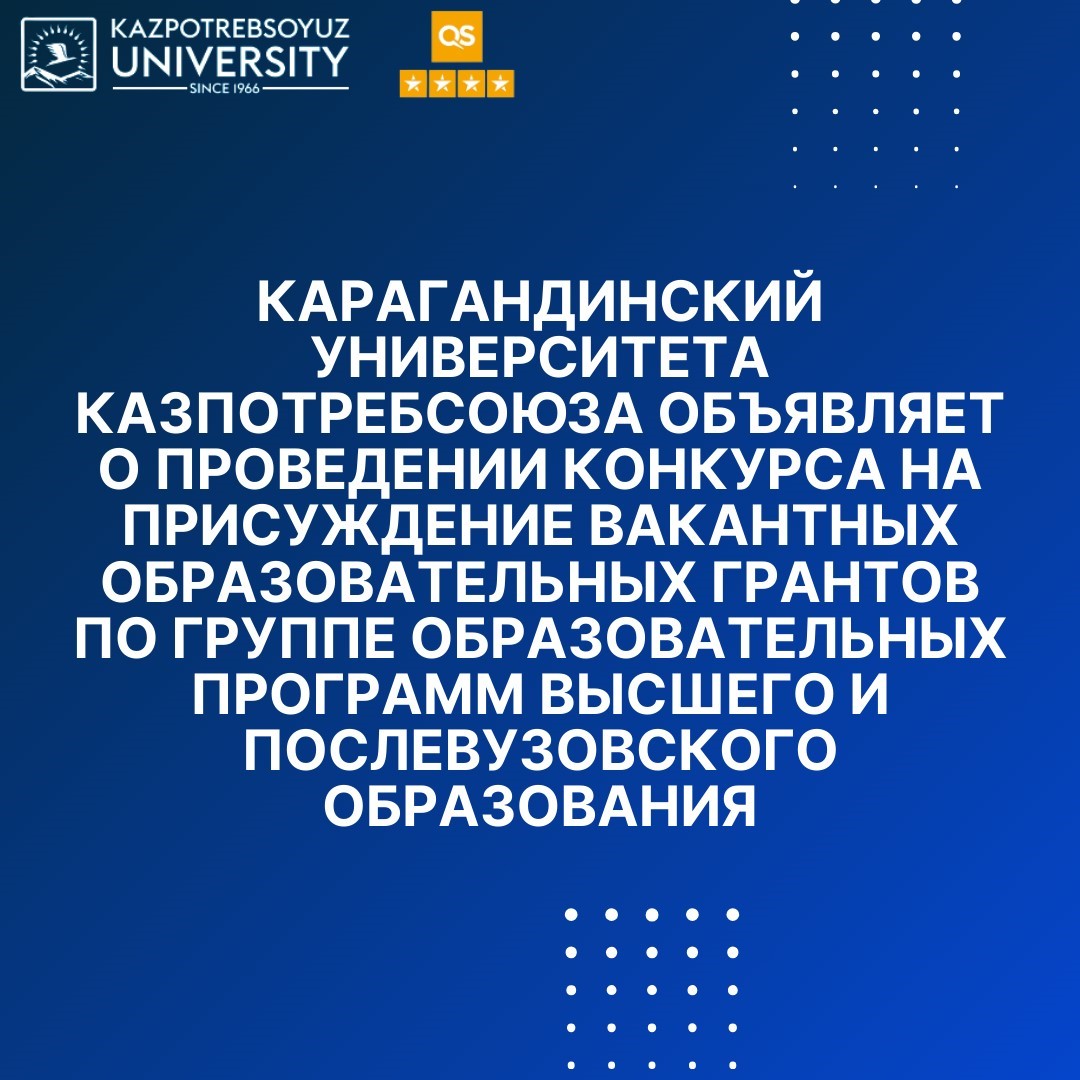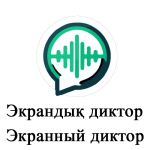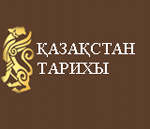-
Speciality Code:
7М04102
Speciality Name:
Economic (profile direction)
Faculty:
Social sciences, economy and business
-
2021-22 Contingent of master students on educational program for5Master students, studying on the basis of the state educational order-Master students, studying on a paid basis5
Содержание образовательной магистерской программы по специальности 7М04102 «Экономика» составляют такие дисциплины, как «Экономическая безопасность фирмы», «Организация инвестиционной и инновационной деятельности предприятия», «Современные проблемы экономики Казахстана», «Экономика социальной сферы», «Управление затратами» и др. Это позволяет приобрести компетенции в использовании методов принятия управленческих решений; в вопросах проведения в Республике Казахстан экономических реформ; в вопросах экономического развития страны; в вопросах методики преподавания экономических дисциплин.
Выпускники магистратуры по образовательной программе 7М04102 - «Экономика» в качестве объектов профессиональной деятельности могут выбирать:
при научной и педагогической подготовке: научно-исследовательские институты; высшие учебные заведения; органы государственного и местного управления; производственно-экономические и планово-экономические, социально-управленческие и маркетинговые, финансово-аналитические службы предприятий и организаций; подразделения внешнеэкономической деятельности.
Выпускнику присваивается академическая степень:
- по научному и педагогическому направлению – Магистр экономических наук по специальности «7М04102-Экономика»;
Срок обучения:
по научному и педагогическому направлению – 2 года.
Форма обучения – очная.
| Degree program: Master of Economic Sciences specialty 7М04102 "Economy" specialized direction | |
|---|---|
| Degree and duration | Single degree (one university) (70 ECTS - credits / 28Kaz. Credits) |
| Education alin stitution | Karaganda University Kazpotrebsoyuz |
| Accreditation | Independent Kazakhstan Agency for Quality Assurance (IKAQA) http://nkaoko.kz/ |
| Period of validity | This program is approved by the University for a period of 1 year for persons who receive a degree at the university from 2018 |
| Level | QF for the EHEA (Qualifications Framework for the European Higher Education Area): 2nd cycle; EQF (European Qualifications Framework): Level 7; NQF (national qualifications framework): level 7 |
- A) Purpose
- The purpose of the educational program of the specialty 7М04102 "Economics" is to prepare innovative and competitive personnel who are ready for active entrepreneurship, have the skills of economic analysis, are able to give current assessment and forecast for activities in the field of economic policy and economic decision-making at the enterprise level with project skills in the field of economics and entrepreneurship with high spiritual and moral qualities
Successful graduates must demonstrate sufficient knowledge and skills in analyzing and planning the activities of the company, developing the ability to make management decisions based on the available analytical information
- The purpose of the educational program of the specialty 7М04102 "Economics" is to prepare innovative and competitive personnel who are ready for active entrepreneurship, have the skills of economic analysis, are able to give current assessment and forecast for activities in the field of economic policy and economic decision-making at the enterprise level with project skills in the field of economics and entrepreneurship with high spiritual and moral qualities
- B) Characteristics
- 1.Discipline/Subject area
- Basic disciplines: Foreign language (professional), Management, Psychology, Mathematical and statistical analysis of economic processes, Mathematical and statistical analysis in assessing and predicting the activities of the company
Main disciplines:
Economic security of the firm, Optimization of the cost of the firm, Diagnostics of the financial crisis, Innovative entrepreneurship, Business diagnostics of the company, Business planning start-up, Comprehensive economic analysis of the enterprise - 2.General information/Specialization
- When implementing the educational program of the specialty 7М04102 "Economics", a credit-modular system for organizing the educational process is used, based on the modular principle of the curriculum, using the credit system and the corresponding educational technologies.
- 3.Direction
- Business and management
- 4.Specialfeatures
- Graduates of the educational program 7М04102 "Economics" are focused on:
- application of scientific methods of knowledge in professional activities;
- Critical analysis of existing concepts, theories and approaches to the study of processes and phenomena;
- integration of knowledge gained in various disciplines, their use for solving analytical and managerial tasks in new unfamiliar conditions;
- conducting a microeconomic analysis of the economic activity of the enterprise and using its results in the management of the enterprise;
- practical application of the norms of the legislation of the Republic of Kazakhstan in the field of regulation of economic relations;
- creative thinking and creative approach to solving new problems and situations;
-conducting information-analytical and information-bibliographic work with the involvement of modern information technologies;
- generalization of the results of experimental research and analytical work in the form of a master's thesis, article, report, analytical note, etc.
- C) Employment and further education
- 1.Employment
- - state and local government appartus;
- production and economic and planning and economic; social, managerial and marketing, financial and analytical services of enterprises and organizations;
- commercial and business structures, divisions of foreign economic activity. - 2.Further education
- Specialized grand PhD courses 6D050600 "Economics
- D) Educationstyle
- 1.Approaches to learning and teaching
- The educational process widely uses innovative educational methods of conducting classes (role-playing, business games, case-method, training, field classes in organizations and institutions, round tables, discussions, drawing up individual and group projects). The training courses include meetings with representatives of various organizations and institutions.
- 2.Evaluation methods
- Midterm; intermediate certification; protection of RPRP reports on pedagogical and research practices (reports); scientific internship (report), final certification (state exam, defense of the master's project)
- E) Programmatic competencies
- 1.General competencies
The program complies with the requirements of the State Compulsory Educational Standard “Post-Graduate Education. Master's program ”to ensure the quality of academic programs at the first cycle level.
GK1 - Apply management skills, psychological knowledge and communication skills in terms of foreign language education in professional activities;
GK2 - Use the mathematical apparatus and skills of economic calculations - 2.Specific competencies
- PC 1 - To be competent in achieving and ensuring the economic security of the company, master the basic concepts, methods and stages of the business;
PC 2 - To be able to analyze and evaluate the economic performance of the company and develop further recommendations and strategies for improving indicators;
PC 3 - Master the methods of analysis and experiment, be ready to put the results into practice, have the skills to plan and conduct applied scientific research in the field of economics, have the skills of oratory, opposing and arguing their thoughts and research results
- 1.General competencies
- F) Full list of program learning outcomes
- In the context of master's professional practice, in work in an organization, as well as with a client, undergraduates can demonstrate the ability to do the following: understand professional practical problems, apply analytical techniques, consultancy activities, master the most important and sustainable knowledge, integrate research results into the educational process and practice ; to be responsible for maintaining partnership, trusting relationships, initiative, independence, tolerance, ability to successfully socialize in society and actively adapt to the labor market and solve modern scientific and practical problems.
- Economic security of the company 2 credits /3 ECTS
- Prerequisites: disciplines: mastery of the basics of economic theory, marketing, management, statistics, micro and macroeconomics, as well as the socio-economic situation and the state of the national economy of the Republic of Kazakhstan. For the most high-quality mastering of the course, the student must possess knowledge of such disciplines as “Enterprise Economics”, “Entrepreneurship”, “Cost Management”.
- Post requisites: after mastering the discipline "The economic security of the company" it is possible to study the following disciplines: "Economics of industry markets", "Organization of investment activity of the enterprise", and other disciplines aimed at studying the resilience and patterns of formation and development of the economic security of the company in the national economy of Kazakhstan . Competencies: as a result of studying the discipline, the undergraduate must know the theoretical foundations and practical aspects of the formation and development of the economic security of the economy; determination of the features of the functioning and development of the economic security of the company; possess skills to perform economic and systematization of factors and mechanisms to ensure the economic security of business entities.
- Purpose: studying the discipline is mastering undergraduates the theoretical and practical foundations and mechanisms to ensure the economic security of enterprises and organizations of the national economy.
- Expected results: Essence and principles of economic security; Basics of the functioning and development of economic security; Indicators and indicators of economic security; Mechanisms for ensuring economic security; Protection of economic interests and protection of trade secrets; Innovative investment security mechanisms of the company; Organizational and informational aspects of economic security; Economic security in the firm’s crisis management system; Analysis and evaluation of indicators of the economic security of the company;
- Professor's full name: Doctor of Economics, Professor Salzhanova Z.A.
- Foreign Language (professional) 2 credits /3 ECTS
- Prerequisites: foreign language, Kazakh / Russian language in the amount of the university course.
- Post requisites: mastering a foreign language at the level of international standards B2, as well as LSP - language for special purposes.
- Purpose: systemic deepening of communicative competence in the framework of international standards of foreign language education based on the further development of skills and abilities of active language proficiency in the professional activities of the future master.
- A brief description of the course: The organization of the financial industry. Regulation and Deregulation. Indefinite group times. Parts of speech - General overview. Retail banking. Commercial and investment banking. The future of bank branches. Group times are continuous. Business correspondence 1 Formal and informal style 1. Perfect, Perfect Continuous group times. Revision of grammar and lexical material. Loans and credit. Passive voice and translation of passive structures. Business correspondence. Modal verbs: may, must, be. Accounting. Types of Accounting. Infinitive and infinitive constructions. Features translation infinitive. Central banking. Monetary policy. Money and banking. Gerund. Features of the transfer of gerund. Types of banks. Banking system. Communion I, II. Translation features. Financing international trade. Clarifying Incoterms. The structure of the English sentence. Revision of grammar and lexical material. Meeting 1. Meeting 2. Controlling meetings. Concluding a meeting. Types of sentences. Foreign exchange. Foreign exchange markets. Exchange rates. Currency trading. Complex sentences. Types of subordinate clauses. Balance Sheet 1. Coordination of tenses. Balance Sheet 2. Subjunctive. Asset management. Regulating the financial sector. Conditional sentences. Revision of lexical and grammar material. Indirect speech. Final test.
- Expected results:
- Ability to conduct dialogic and monologue speech in English;
- Conduct conversations on professional, business and everyday topics;
- Perceive English speaking by ear (professional terminology);
- Mastering business writing skills;
- Reading and translating specialty texts with and without a dictionary;
- Understand the content of the read;
- Transfer read content;
- Use of reference books (explanatory and other dictionaries, reference books, encyclopedias).
- Professor's full name: Ph.D., Professor G. Aubakirova
- Management 3 credits / 5ECTS
- Prerequisites: "Economic Theory", "Microeconomics", "Macroeconomics", "International Economics"
- Post requisites: "State regulation of the economy", "Enterprise economy"
- Purpose: mastering students of the basic principles and methods of organizing and managing an enterprise, studying, systematizing and fixing the fundamentals of the theory and practice of managing enterprises in modern business conditions, decision-making processes in the field of management, acquainting them with modern methods and methods of working in conditions of industry competition, since the formation market economic relations requires the training of qualified professionals, armed with new knowledge and skills that possess modern apparatus for solving fundamentally new tasks.
- Expected results:
- master the theoretical foundations of management;
- to master the methods of implementation of basic management functions (decision-making, organization, motivation and control);
- to master modern technologies of effective influence on individual and group behavior in an organization;
- master the methods and basic techniques of research activities in the process of improving the management of the organization;
- to improve the skills of independent work and the development of the need for personal and professional self-improvement.
- Professor’s full name: Blyalov B.E.
- Psychology 2 кредита/3 ECTS
- Prerequisites: philosophy, sociology, cultural studies.
- Post requisites: Pedagogy, Methods and technologies of teaching, teaching practice.
- Purpose: training of undergraduates in the basics of higher education psychology, expansion of their professional capabilities in the application of psychological knowledge in the field of educational activities.
- A brief description of the course: Introduction. The subject, tasks and structure of the psychology of higher education. Education as a global object of higher education psychology. Psychological basis of the learning process. Psychology of students' cognitive activity in the learning process. Psychological methods and means of improving the efficiency and quality of education in modern conditions. Management of the learning process. Student as a subject of educational activity. Psychological basis of the process of education. The problem of education in higher education. Education and the development of professional identity. Problems of psychodiagnostics of professionally-oriented personality. Psychological counseling of students and teachers, taking into account the profile of the future professional activity of a specialist. Psychology of pedagogical communication. Psychology of pedagogical influence. The problem of interpersonal interaction of the teacher and students.
- Expected results:
- to know the prospects of the development of psychological science and to understand the role of psychology in the professional activities of a university teacher;
- apply methods of studying the character traits of people and psychological influence on students and student groups in various spheres of professional activity;
- carry out analytical and synthetic activities in assessing the possibilities and limitations of psychological techniques in managing conflicts in the pedagogical process of the university, psychological factors of efficiency and optimization of the educational process, stimulating students' learning and cognitive activity, etc. and formulate conclusions on this basis;
- to provide an interpretation of the results of psychological methods of diagnosing, studying the psychological factors of the educational process and educational and cognitive activity of the student in various forms of communication (characteristics, references, projects, mini-studies, etc.).
- the need for personal development and professional self-education.
- Professor's full name: Ph.D., associate professor Kenzhebaeva SK
- Mathematical and statistical analysis of economic processes 3 credits/5 ECTS
- Prerequisites: Economic theory, Mathematics in Economics, Microeconomics, macroeconomics, Statistics, Informatics.
- Post-requisites: practical training, writing a master's project
- Objective: to master the theoretical foundations of the application of statistical methods for the analysis of economic processes and practical skills in the formalization of economic problems, the construction of mathematical models, meaningful interpretation and analysis of the results of calculations.
- Brief description of the course: the Role of mathematical and statistical methods in the modern economy. Statistical methods of processing and analysis of economic information. The use of methods of analysis of variance in the economy. Cluster analysis and its role in economic research. The method of linear discriminant analysis. Analysis of consumer behavior model. Analysis of the behavior model of manufacturers. Analysis of the model of interaction between consumers and producers. Analysis of economic processes using the equation of pair linear regression. Nonlinear regression analysis. Application of multivariate linear regression models in the economy. Elasticity in economic analysis. Methods of analysis of the dynamics of economic processes. Time series analysis using growth curve models. Methods of analysis of economic processes subject to seasonal fluctuations.
- Expected results: acquisition of practical skills in statistical data processing and mathematical modeling, as well as independent applied research of economic processes, using statistical and mathematical methods of analysis and modern information technology
- Mathematical and statistical analysis in the evaluation and forecasting of the company 3 credits/5 ECTS
- Prerequisites: Economic theory, Mathematics in Economics, Microeconomics, macroeconomics, Statistics, Informatics.
- Post-requisites: writing a master's project
- Purpose: formation of theoretical knowledge and practical skills in the use of statistical methods for assessing and forecasting the economic performance of the company.
- Brief description of the course: Content, objectives and methods of evaluation and forecasting of the company. Information support of economic forecasting. Methods of predictive studies. Intuitive estimation and prediction methods. Assessment and forecasting of economic indicators of the company on the basis of a single-factor model of linear regression. Estimation and forecasting with non-linear regression equation. Estimation and forecasting based on multivariate regression model. Forecasting taking into account time lag. Statistical description of the development of economic processes using time series. Methods of forecasting the dynamics of economic indicators of the company. Methods of forecasting economic indicators of the company using trend models. Forecasting using trend-seasonal models. Adaptive forecasting methods. Models of stationary and non-stationary time series. Verification of economic forecasts.
- Expected results: the acquisition of practical skills in assessing and forecasting the economic performance of the company, using statistical and mathematical methods of analysis and modern information technology
- Optimization of company costs 3 credits/5 ECTS
- Prerequisites: enterprise Economics, Microeconomics, " Pricing»
- Post-requisites: writing a master's project
- Goals and objectives: the purpose of the discipline – to acquaint undergraduates with the theoretical and practical aspects of cost optimization as a diverse economic category, the process of formation of production costs and circulation as places of formation of costs, and for various types of products and the formation on this basis of information necessary for decision-making on cost optimization, including planning, management and control.
- Objectives of the discipline:
- to form an understanding of the theoretical laws of the concept of expenses as a diverse economic category in the firm;
- to form an understanding of the theoretical and practical laws of the process of formation of production and circulation costs and their optimization;
- to form knowledge of methods and methodological bases necessary for making decisions on cost optimization (planning, management and control);
- to form knowledge about the methods of analysis and development of strategies to optimize the company's costs;
- to form the ability to choose an effective solution to optimize the costs of the company;
- to form the skills of educational and research activities.
- Brief description of the course:
- Classification of the company's costs. Production cost. Calculation of production costs. The basic principles of calculation of circulation costs. Methods of optimization of costs of firm. Principles of cost optimization. Ways to optimize costs. Cost monitoring as a means of optimization. Cost-benefit analysis when making optimization decisions. Cost control.
- Expected results: thus, as a result of the development of the course of academic writing undergraduates will be:
- To master the methodology and methodology of the discipline "strategic cost management", contributing to the knowledge of future specialists in the field of the main categories of the discipline.
- To be able to apply theoretical knowledge in practice and understand their purpose and role in solving professional problems.
- C. develop arguments and make decisions through the search, collection, analysis and systematization of information.
- To provide information in various forms of communications, to cooperate and to work in the group, to argue and defend their position, to make decisions.
- E. acquire skills to implement a set of measures included in the management system.
- Diagnosis of financial crisis 3 credits/5 ECTS
- Prerequisites: economic theory, management, Finance, financial management, economic analysis
- Post-requisites: practical training, writing a master's project
- Objective: to Study the causes of the financial crisis in the company, namely: the General decline in the market, the wrong development strategy, and ineffective management. The study of the use of universal tools: cost reduction, sales promotion, optimization of cash flows, work with debtors and restructuring of accounts payable.
- Brief description of the course: reducing the efficiency of capital use, reducing profitability and absolute values of profit; the emergence of loss of production; lack of own funds and reserve funds analysis of the effectiveness of the current strategy and its functional areas (strategy in the field of financial management, sales and production); monitoring changes in key performance indicators of the company in functional areas; analysis of competitive advantages of the company, its strengths and weaknesses, as well as opportunities and threats ( SWOT-analysis); analysis of competitive prices and costs of the enterprise, periodic marketing research and operational monitoring of competitors.
- Expected results: diagnosis and recognition of the crisis situation; definition of the crisis "focus", definition of outdated technological processes, uncontrolled growth of costs, incorrect positioning of goods in the market; development of methods of" treatment"; formation of an enlarged plan to overcome the crisis.
- Name of lecturer: PhD, associate Professor Z. M. Sadvakasova
- Business planning start-UP3 credit / 5 ECTS
- Prerequisites: economic theory, management, business planning, project management, project analysis
- Post-requisites: practical training, writing a master's project
- Purpose: to form undergraduates system, professional knowledge, skills and business planning of innovative projects'.
- Brief description of the course: "business planning startup projects": the formation of a set of theoretical knowledge and practical skills in the management of innovative projects of economic entities, taking into account the prevailing conditions of the organization and conduct of business in the national economic system. This course is aimed at a comprehensive study of General theoretical and practical issues of organization and planning of innovation.
- Expected results: to master the basic concepts, methods and stages of implementation of the startup project, in accordance with the latest requirements for scientific and innovative activities.
- To be Able to apply theoretical knowledge in practice and understand their purpose and role in solving professional problems.
- C. develop arguments and make decisions through search, collection, analysis and systematization.
- To Provide information in various forms of communications, to cooperate and to work in the group, to argue and defend their position, to make decisions.
- E. Acquire skills for the implementation of complex research activities and to properly solve the goal and objectives of the startup of the design.
- Name of lecturer: Dr. S. B. PhDБайбосынов
- Innovative entrepreneurship 3 credits/5 ECTS
- Prerequisites: Entrepreneurship, enterprise Economics, Economic theory, Microeconomics
- Post-requisites: practical training, writing a master's project
- Purpose: formation of undergraduates necessary skills and competencies for successful work in the field of entrepreneurship, innovation in the market.
- Tasks:
- master's degree students mastering the theoretical foundations of innovative entrepreneurship, such as: theoretical, methodological and empirical knowledge in the field of innovation;
- acquisition of knowledge of the processes and laws of formation of the national innovation system, the structure and mechanisms of the innovation market, as well as an idea of the strategic role of innovation at the micro level;
- the acquisition by students of practical skills in the field of management of innovative activity at the firm level, the planning and organization of R & d processes, decision making and substantiation of decisions on the methods of commercialization of scientific and technological innovation in conditions of uncertainty and risk.
- Brief description of the course: Innovative essence of entrepreneurial activity. The life cycle of innovation and resource provision of innovation. Financing of innovative activity at the expense of own funds. Risks of innovation. Evaluation of the effectiveness of innovation. Economic and calendar planning of the pre-production stage of the innovation project. Organizational forms of innovation.
- Expected results: as a result of the study of the discipline undergraduate should know the current trends and varieties of innovative entrepreneurship and its decisive influence on the development of productive forces, be able to assess the economic situation of an economic entity in the market, to know: the method of choosing the strategy and tactics of innovative behavior, allowing to obtain and maintain competitive advantages of the enterprise.
- Business diagnostics of the company 3 credits/5 ECTS
- Prerequisites: "enterprise Economics", "macroeconomics", "Economic theory", "Statistics", " Economic analysis»,
- Post-requisites: writing a master's project
- Goals and objectives: the Goal is to provide a comprehensive assimilation of scientific knowledge and practical skills to identify the most important problems and priorities of economic activity and the development of a model of behavior in the market, which will improve the efficiency and financial performance of the enterprise. A prerequisite for the study of this course is the consideration of economic analysis as a comprehensive assessment of the business, as the study are all the main aspects of the economic activities of the company and thus develop balanced recommendations for the implementation of specific management measures, taking into account all important aspects of the business.
- Brief description of the course: Analysis of the company's position in the market and its adaptability to the conditions of economic conditions. Analysis of the financial condition of the company. Analysis of internal production efficiency: analysis of the use of resources, analysis of the dynamics of the value and structure of costs. Analysis of the investment strategy of the company.
- Comprehensive economic analysis of the company 3 credits/5 ECTS
- Prerequisites: "enterprise Economics", "macroeconomics", "Economic theory", "Statistics", " Economic analysis»,
- Post-requisites: writing a master's project
- Goals and objectives: the Aim of developing the students skills using the professional knowledge for conducting analysis and evaluation of the firm's activities in the economic, social aspects.
- Course objective:
- development of skills to perform a comprehensive economic analysis of the enterprise
- to form a methodological and theoretical basis for independent analysis and development of quality solutions
- Brief description of the course: Organization and information support of the analysis of enterprises. Method and methods of analysis of financial and economic activity. The system of reserves to improve the efficiency of economic activity. The method of complex analysis of economic activity of the enterprise. Analysis of financial results.
- Expected result:
- As a result of the development of the discipline undergraduate should:
- to form a master's ability to critically analyze and select the most suitable methods of economic analysis for research,
- develop the skills of information consolidation for conceptual, institutional qualitative analysis,
- have the skills to prepare analytical materials for the assessment of economic policy activities and strategic decision-making at the micro and macro level;
- will be able to carry out a critical assessment of indicators of economic development of the enterprise
- form a complete system of knowledge on understanding the nature and regularity of the processes occurring both within the enterprise and in its market environment.












.jpg)











































